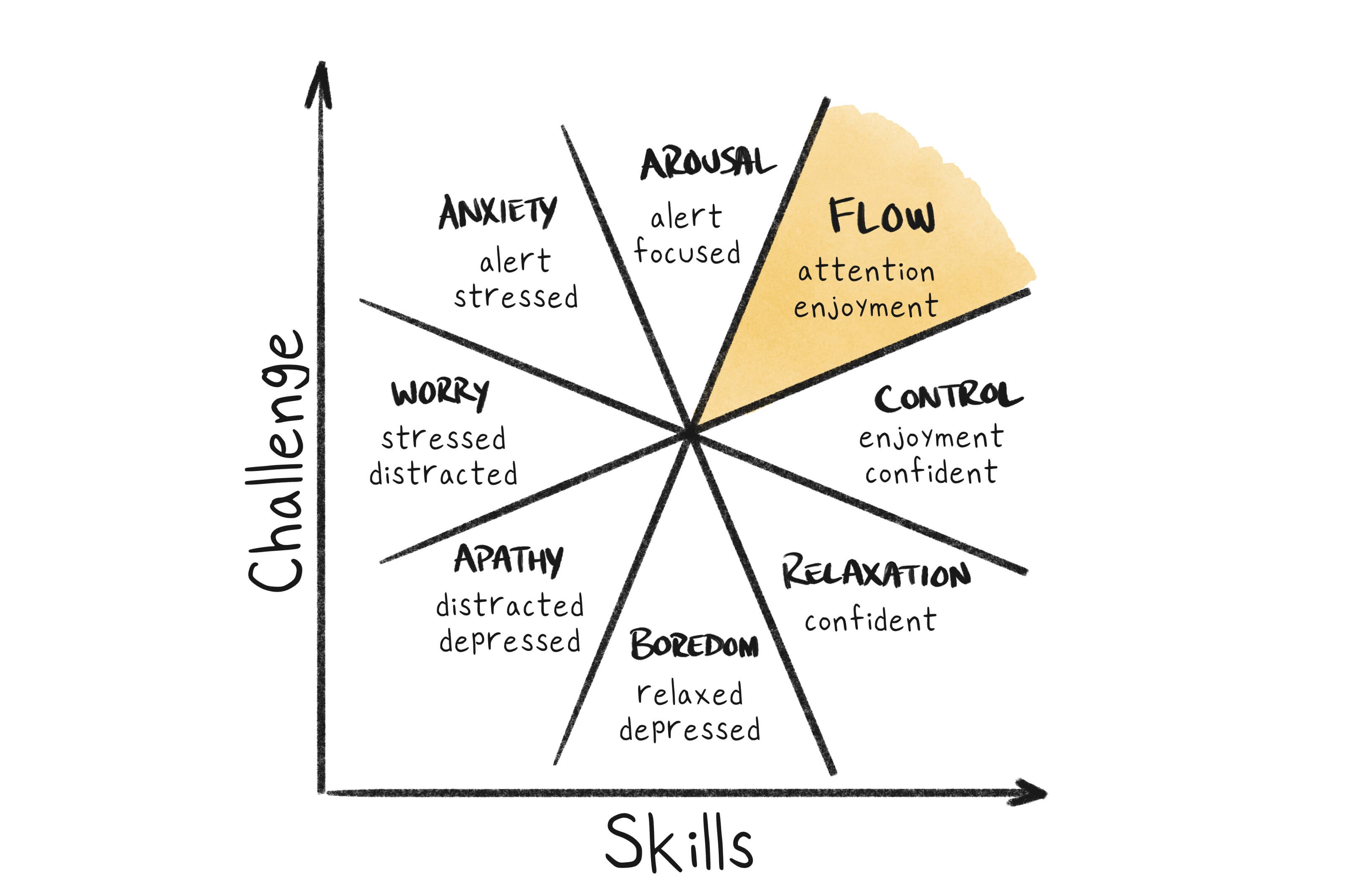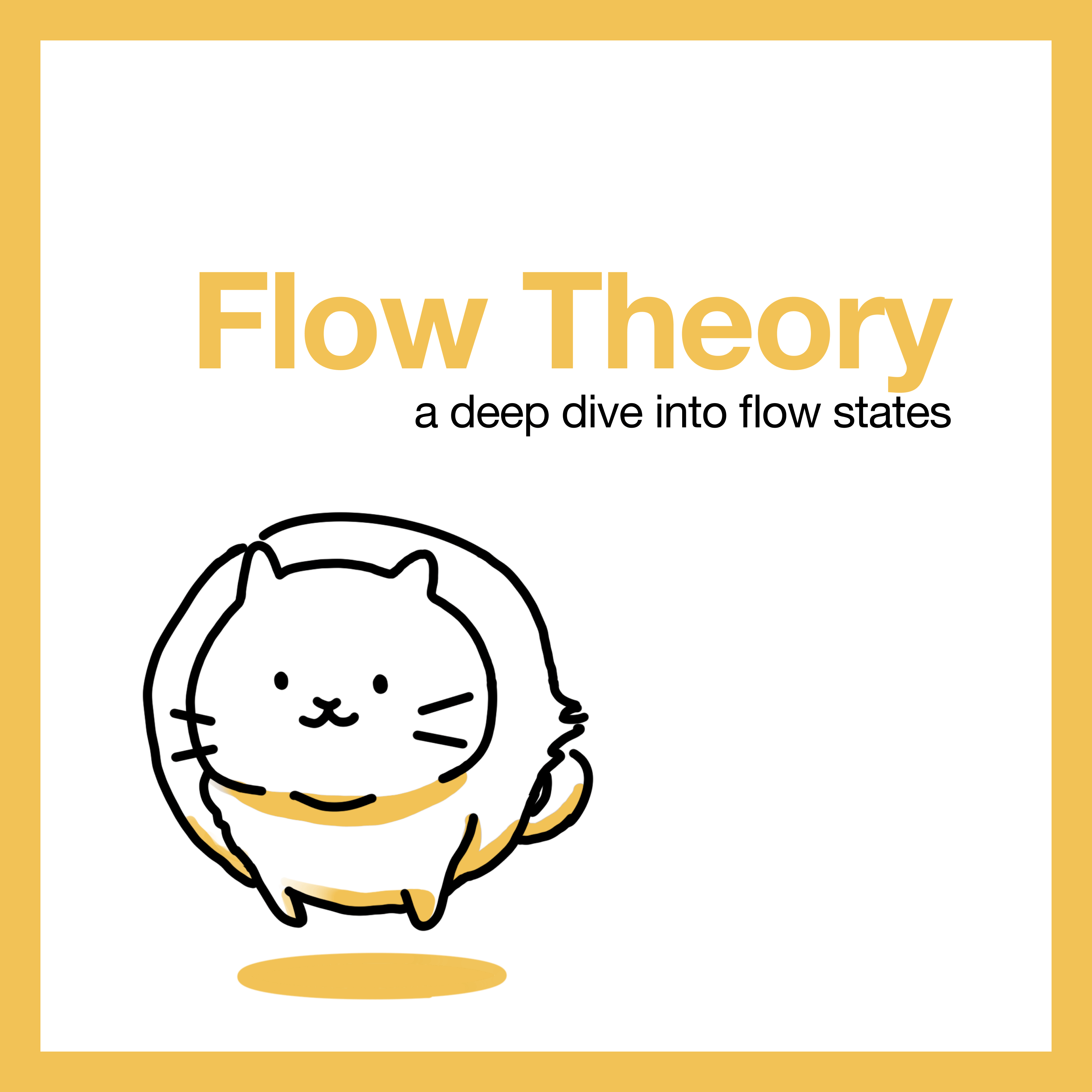We're continually fascinated with flow states here at TeuxDeux. For the uninitiated, a flow state is a state of mind where one experiences energized focus on the present moment and enjoyment in the process of an activity or task. In this mental state, you are fully immersed in the task at hand and time flies by. The phenomena was named by Mihaly Csikszentmihályi in 1975 but the concept of flow has continued to spark conversations in the field of positive psychology (read our primer on flow states). Today, we're going to dig deeper into what it takes to achieve an optimal flow experience.
The Conditions of Flow
You can enter a state of flow while performing just about any activity although it's more likely to occur when you have intrinsic motivation. Passive activities like watching TV do not elicit a flow experience. While you can certainly lose track of time binge-watching TV, you need to actively be doing something to achieve a flow state. Beyond that, flow theory postulates three conditions that need to be met in order to achieve a flow state:
The activity must have clear goals and progress. This allows for direction and structure when performing the task.
There must be clear and immediate feedback. This helps you navigate changing demands so you can adjust your performance and maintain the state of flow.
You must have a good balance between perceived challenges of the task and your own perceived skills. In other words, you should have confidence that you are capable of completing the task.
These prerequisites are great, albeit a bit wordy. We prefer Owen Schaffer's even simpler take which identifies seven conditions for flow in layman's terms:
Knowing what to do
Knowing how to do it
Knowing how well you are doing
Knowing where to go (if navigation is involved)
High perceived challenges
High perceived skills
Freedom from distractions
It's been theorized that people with autotelic personalities have an easier time achieving flow states. These personalities tend to exhibit traits like curiosity, persistence, low self-centeredness, and an inclination for doing things for intrinsic reasons. The term comes form the Greek words for self and goal. The main objective is to have the experience, there is no expectation of future benefit. That's not to say that flow experiences are unattainable for the rest of us. It may just require a little focus and self-awareness.
Finding the Balance
It can be difficult to strike the right balance between the perceived level of challenge and your level of skill. Tip the scale too far in either direction and you might not achieve an optimal state of flow. In 1987, Csikszentmihályi, Fausto Massimini, and Massimo Carli published a flow model depicting eight different states of varying challenge and skill levels, now commonly known as the Eight Channel Model.
If challenge is too high, you'll become anxious about your performance and the outcome. If challenge is too low relative to skill, you'll get bored. If both challenge and skill are low, you'll feel apathy. Only when a person's skill level and the level of challenge are both high, will they begin to experience the deep involvement and enjoyment of a flow state.

There are some states depicted in the model that aren't necessarily bad, but can be optimized by following flow theory. In the Arousal state, you are focused, active, and involved but don't feel strong, cheerful or in control. In this scenario, you can return to an optimal state of flow by learning new skills.
In a Control state, you feel happy, strong, and satisfied but lack concentration and the feeling that your work is important. To get to a flow state from Control, you can increase the level of challenge. In this way, arousal and control are important states for learning.
Flow Theory in education
Flow theory isn't just limited to social psychology, it's also a popular topic among educators. One can see how the flow model can be applied to a classroom setting to increase student engagement and help students have more agency and structure in their learning.
In the 2000s, Csikszentmihályi and psychologist Kevin Rathunde conducted a multi-year study of educational settings and found that students achieved flow experiences in Montessori settings. The Montessori method seemed to intentionally provide more flow opportunities and experiences than traditional education settings.
Other conditions in the eight channel flow model are less favorable for learning. When a person is anxious or worried, the steps toward flow seem insurmountable and they'll tend to retreat to less challenging activities. When we feel bored or apathetic, we gravitate towards ready-to-consume sources of entertainment and stimulation.
Why Flow Theory resonates
Finding flow requires energy and attention, two things that we are rarely willing to expend. If it requires such extraordinary effort, why are people so enthralled with the concept of flow? Csikszentmihályi argues that maximizing flow correlates with optimal happiness. It's a pathway to greater fulfillment and well-being but is not a state of happiness itself...we'll explain.
When we're in flow, we are not happy, per se. In a flow state, you experience loss of self-consciousness. You are so focused on the task at hand that there's no space for distracting thoughts or feelings, including happiness. Only after you've completed the task do you have the time to reflect and appreciate the flow experience.
We can experience happiness from passive activities as well but those are usually dependent on or vulnerable to external factors. The happiness derived from flow states is of our own making. This kind of happiness is not reliant on extrinsic motivation and can lead to increased mindfulness, complexity and growth of consciousness. Hopefully, this guide helps you identify which state you're in so you can take the right steps toward optimizing flow!
